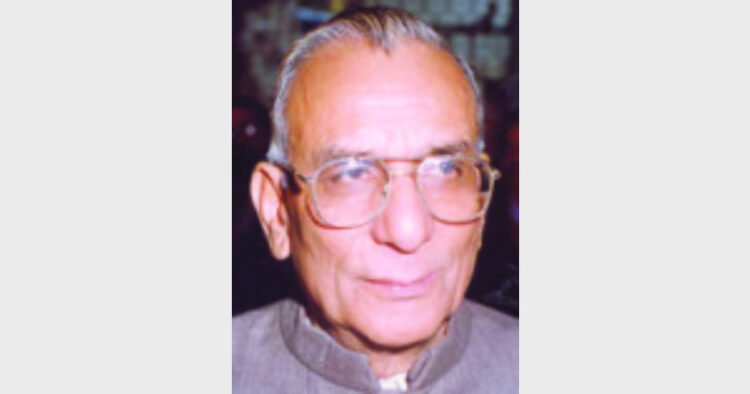India needs an effective to combat terrorism
Centre must take all stakeholders on board to address their concerns?
Shyam Khosla
 No one genuinely concerned about threat to internal security posed by terrorist gangs and Maoist guerillas can oppose the setting up of an effective mechanism to combat terrorism and Maoist menace. If the Chief Ministers’ meeting called by the Prime Minister on May 5 to discuss the contours of the proposed National Counter-Terrorism Centre (NCTC) witnessed so much controversy, it was largely because of the Congress party’s propensity to take contentious decisions without taking the opposition, non-Congress state governments and even its own allies on board.
No one genuinely concerned about threat to internal security posed by terrorist gangs and Maoist guerillas can oppose the setting up of an effective mechanism to combat terrorism and Maoist menace. If the Chief Ministers’ meeting called by the Prime Minister on May 5 to discuss the contours of the proposed National Counter-Terrorism Centre (NCTC) witnessed so much controversy, it was largely because of the Congress party’s propensity to take contentious decisions without taking the opposition, non-Congress state governments and even its own allies on board.
It is a sign of authoritarian mind-set if you issue a notification to set up NCTC that many perceive to be an encroachment into the domain of the states and a subversion of the spirit of federalism without taking into account the concerns of all stake holders. Consultations before announcing a decision are an integral part of the democratic process and a pre-condition in a federal polity. Conducting consultations after loud protests from political opponents and strong protests from several Chief Ministers are bound to create a trust deficit. Turf games come in to play and vitiate atmosphere. Even the well intentioned move acquired a controversial hue and your promises to revisit contentious issues fail to inspire confidence. UPA Government’s inept handling has led to unnecessary controversy over this big-ticket initiative and is causing avoidable delay in setting up NCTC or a similar mechanism to combat terrorism that poses a grave threat to internal security.
Trust deficit is at the root of the bitter opposition to the proposed NCTC from several quarters. The Congress party repealed POTA – an anti-terrorism legislation enacted by NDA in 2002 – immediately after coming to power in 2004 on the facile premise that it had been “grossly” abused as if no other law had ever been abused. Popular perception is that the law was repealed because of vote bank politics. The invention by the UPA Government of the specter of Hindu terror was motivated by petty partisan interests. No one allegedly involved in the “Hindu terror” has so far been convicted even as the central agencies are in the dock for bribing people to implicate innocent people in these cases. Earlier, during 1970s, Indira Gandhi Government enacted MISA ostensibly to deal with smugglers, drug traffickers and terrorists. Instead, it was abused to put behind the bars political opponents and uncomfortable journalists during the hated Emergency. The Union Government’s bias against non-Congress governments is too obvious. While the Congress-run Government in Maharashtra has MCOCA legislation against organised crime – GUJCOCA, its replica in BJP-run Gujarat, is unacceptable to the Centre. UPA ally TMC is one of the bitterest critics of the Union Government’s proposal on NCTC and dismissed it as a death-blow to federalism.
The country faces existential threats from Pak-inspired Jihadists and Maoists. Official figures show that more than one lakh innocent lives have been lost since the advent of terrorism in India. There is a compelling need to counter these menaces. More than seven years ago, the Prime Minister declared Maoist insurgency as the single biggest threat to national security. Yet no clear and coherent policy to deal with this threat has emerged.
True, the Union Home Minister tried to bring all Naxal-affected states on board to counter insurgents and promised to increase state polices’ capacity to undertake counter-insurgency operations. He talked of simultaneously undertaking integrated development in areas vacated by insurgents. There was not much progress because several states run by regional parties like JD (U), TMC and BJD and the left parties didn’t show much enthusiasm about the joint action plan. In certain cases, State Governments wrongly thought that they can use left extremism to weaken their opponents. Some State Governments and busybodies say rebels are “misguided” patriots who need to be brought round through talks. Union Government’s frustration with some of the State Governments is manifest in the Home Secretary R K Singh’s observation before a parliamentary panel that “lack of commitment” of certain Naxal-affected states was a serious problem in tackling rebels. The manner in which the Odisha Government came down on its knees to secure the release of two Italians and BJD legislator Jhina Hikaka is a case in point. Left Government in West Bengal was soft to Naxals till they started killing and abducting Communist leaders. The same can be said about TMC Government that succeeded them.
In the last 10 years, we have lost one security personnel for each Maoist cadre killed. This is much higher than the global average and is totally unacceptable. More than 18,000 violent Maoist-related incidents took place during the period and there is no sign of insurgency abating. States have a point in asserting that law and public order is a state subject. But they need to realise that insurgents move around freely through the jungles and remote villages along the borders of multiple states. They move to adjoining states when Andhra became too hot for them. Andhra is the one state that had effectively dealt with Naxals largely because of the commitment of the TDP Government and the quality of intelligence back up it received. This success can be replicated in all affected states only if they have a common strategy, mutual trust and faith in the central agencies and launch a concerted drive to corner rebels.
Maoists have no faith in democracy and they don’t want development. In fact, they put hurdles in all development activities as building of roads, hospitals and schools will reduce their acceptability to the deprived sections of rural and Vanvasi population and give an edge to the security forces. Maoists, declared aim is to overthrow the democratically elected government through an armed struggle. They use talks or negotiations over release of hostages to regroup and strengthen themselves. This happened in Andhra when on the eve of a crucial election the Congress Government declared a cease fire with Naxals in a secret pact to seek their support in the polls. The Congress party captured Andhra but the consequences for the fight against rebels were disastrous. Several mutually hostile groups of Naxals used the cease fire to hold secret talks in West Bengal and emerged as an energised single outfit CPI (Maoists). There are lessons to be learnt from such stupid maneuvers and blunders. The State should negotiate from a position of strength if peace and public order is to be restored.
The Parliament responded to 26/11 attack and amended the Unlawful Activities (Prevention) Act and enacted the National Investigative Agency Act. Although it was stated that the NIA could take over any terrorist case registered in any state after receiving a direction from the Union Home Ministry, regretfully only one such case has so far been referred to it. Didn’t this happen because no effort was made to mobilise political consensus across the board? Turf battles among agencies did the rest. Jihadists choose place and time of attack as per the directions of their handlers while the nation continues to be at the receiving end of the low-cost proxy war launched by Pakistan. The situation becomes grimmer if it is proved that Iranians were involved in the killing of an Israeli diplomat in New Delhi.
NCTC was conceived to prevent terrorist attacks and in the event of an attack to investigate holistically. After facing stiff opposition from not only non-Congress governments but also its own ally – TMC – at the Chief Ministers’ conference, the Union Home Minister has promised to revisit two most-contentious provisions in the notification. Acknowledging that even Congress Chief Ministers who broadly supported the idea were critical of locating the new agency under IB, P Chidambram said the Government would review this provision. The other provision that disturbed the states to no end is about the vesting of NCTC the powers to arrest, conduct searches and seize incriminating documents and properties. While agreeing to review this provision, the Home Minister says these powers were to be exercised only in exceptional circumstances and that the agency would inform the state government concerned immediately after the operation. This will have to change as this may pose serious problems to the State concerned as raids conducted by fly-by-night NCTC without taking the state administration into confidence may create law and public order and social problems that have to be faced by the State concerned. Yet another amendment in the notification issued earlier would be that DG of Police and ATS will be part of the NCTC.
The Government could have avoided trouble in setting up NCTC or a powerful instrument to counter terrorism under any other name had it taken the BJP, the principal opposition party that is in power in eight states of the Union, on board. Its unwillingness and inability to strike a dialogue with the opposition and state governments has come to haunt the Centre. It should persuade the BJP to come on board and try to remove the misunderstandings its autocratic approach has created if the NCTC is not to be put in the cold storage. Federalism has emerged an issue because of Congress party’s mishandling. It is not that much an issue of federalism or Centre versus States as that of the Congress party’s tendency to centralise all powers and depriving the states of their powers and authority.
A strong Centre with strong states is the ideal situation. India is a federation with unitary features. It is a Union of State and not a United States of India. The Constitution we gave to ourselves conceives India as a body of which states are its limbs. Unlike USA, India was not created by bringing some states together. We created and re-created states for administrative convenience. India is one country and we must have an effective national counter terrorism mechanism like the Homeland Security in USA. Such an agency can’t be part of IB. It must be an independent body accountable to the Parliament.?













Comments